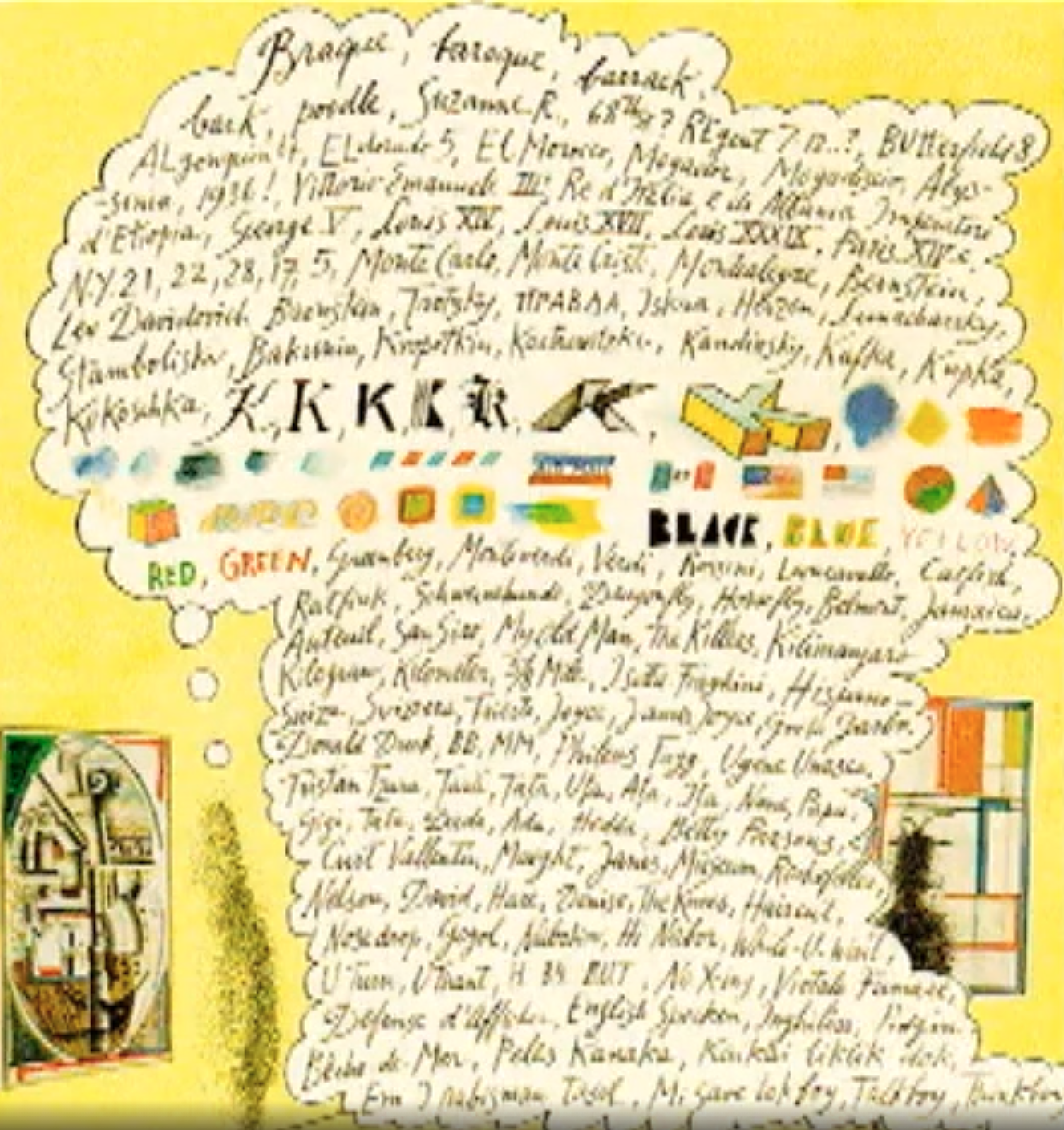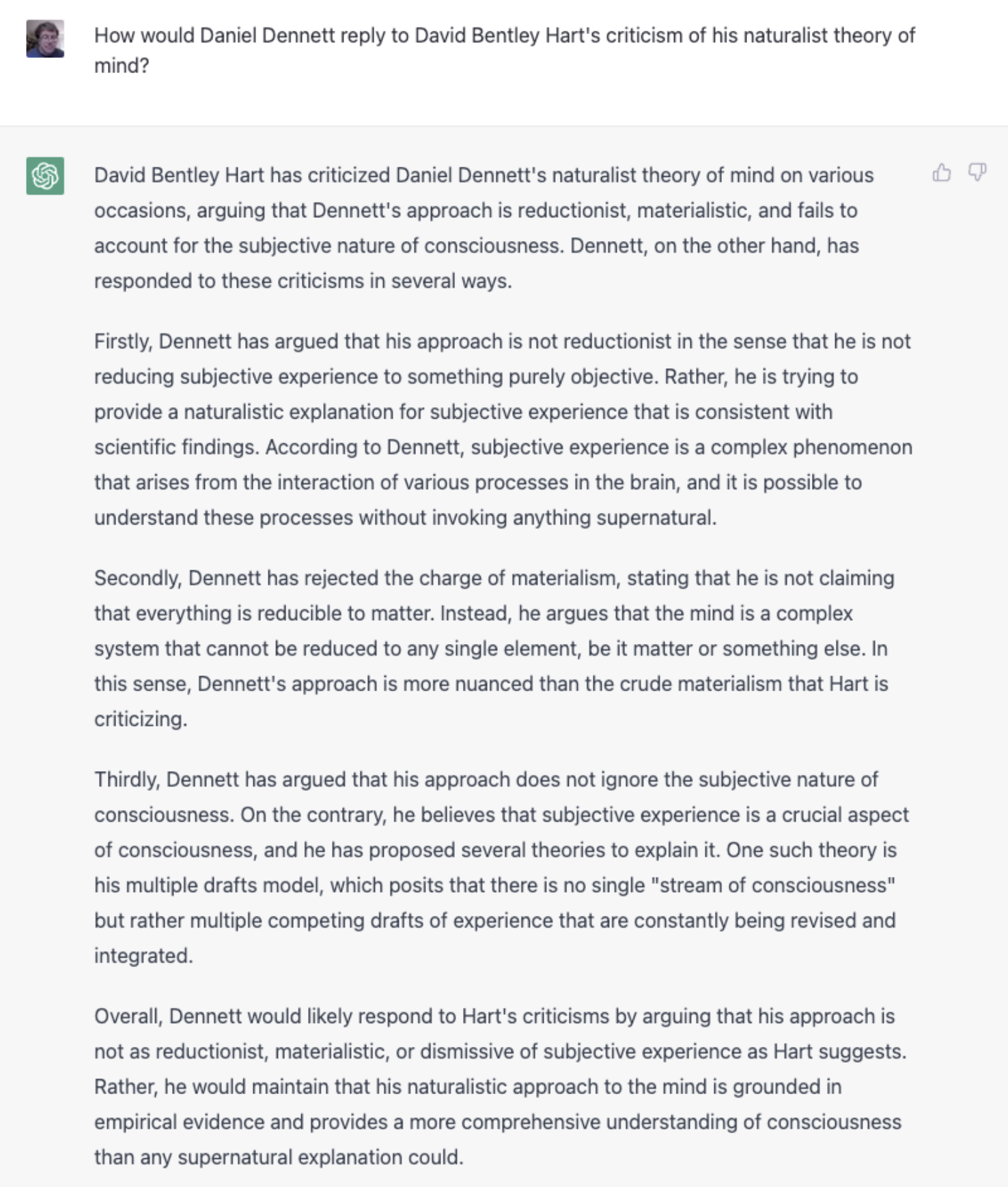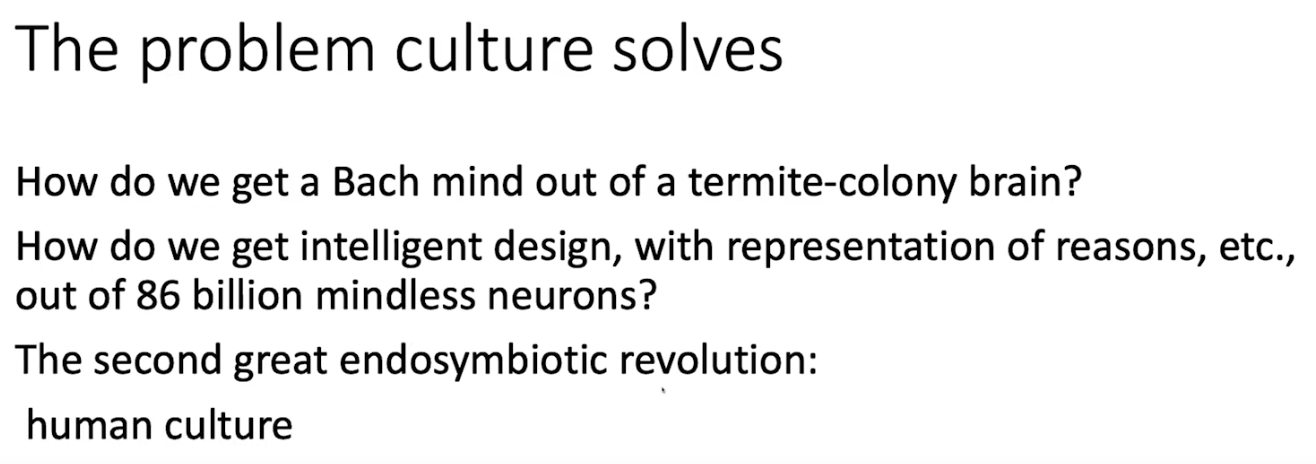Dennett
07 Sep 2022 - 29 Sep 2025
- At the MIT AI lab, he was considered to be the One Good Philosopher, and I've read him that way myself. I suppose nowadays I'd call him the Least Bad Analytic Philosopher, or more specifically the one who can best use philosophy to illuminate the nature of mental machinery.
- In the eyes of Weird Studies though, he's the worst philosopher, kind of emblematic of everything they hate. I have a weak goal of convincing them otherwise, but I feel I have about as much chance of doing that as of convincing Marvin Minsky to take Heidegger seriously something I actually tried to do – pretty ambitious of me in retrospect. If I had succeeded it would have been quite a feat of intellectual peacemaking and diplomacy.
Many of those same theorists [who support Fodor modules] have been lukewarm-to-hostile about Marvin Minsky's Agents, who form The Society of Mind (1985). Minsky's Agents are homunculi that come in all sizes, from giant specialists with talents about as elaborate as those of Fodorian modules, down to meme-sized agents (polynemes, micronemes, censor-agents, suppressor-agents, and many others). It all looks too easy, the skeptics think. Wherever there is a task, posit a gang of task-sized agents to perform it—a theoretical move with all the virtues of theft over honest toil....
- – Consciousness Explained, p261
- Dan Dennett: The illusion of consciousness | TED Talk
- Everybody thinks they are an expert on consciousness
- cites Rod Brooks, we are an agglomeration of robots, none of whom are conscious.
- normies: real consciousness cannot be a bag of tricks (contra Minsky).
- Facing Up to the Hard Question of Consciouisness
All the comprehension, appreciation, delight, revulsion, recognition, amusement, etc. that human beings experience must be somehow composed by the activities of billions of neurons that are myopic in the extreme, cloistered in their networks of interacting brethren, oblivious to the larger perspective they are helping to create. But how? That is the hard question.
Every animal does an acceptable job of controlling its degrees of freedom under normal circumstances. Otherwise, it would be extinct. So, every human being does this as well, but in the human case, the task of governance is magnified by the essentially limitless numbers of degrees of freedom that can iterate and ramify and amplify effects. Taking care of this embarrassment of riches is—to oversimply—what consciousness is for.
- Note that he takes consciousness as perfectly real here.
- 2023 thinkpiece on AI The Problem With Counterfeit People - The Atlantic
- I couldn't find any Dennett responses to Acid Horizon/David Bentley Hart, We Are Not Software so I asked ChatGPT to make one, it did a pretty good job!
- John Gray on Derrida opens with some good potshots at DD Deconstructing Jackie
In an interview in the Guardian in 2017, the celebrated rationalist Daniel Dennett declared: “I think what the postmodernists did was truly evil. They are responsible for the intellectual fad that made it respectable to be cynical about truth and facts.” If Dennett’s anathema was heard in the afterlife by Jacques Derrida, who died in 2004 renowned as the progenitor of what is commonly described as postmodernism, his shade must have smiled. Nothing is more characteristic of evangelical rationalists than the demonological discourse of fundamentalist religion. But what can “pure evil” mean for those who claim to have exorcised all traces of the supernatural in their thinking? In the same interview, Dennett describes himself, evidently without irony, as “an eternal optimist”. By what magic does he imagine unadulterated malevolence can be banished from the world? Such enemies of postmodernism beg to be deconstructed whenever they open their mouths.
- .> “Only a zombie like Dennett could write a book called ‘Consciousness Explained’ that doesn’t address consciousness at all,” the computer scientist Jaron Lanier has written. – Daniel Dennett’s Science of the Soul | The New Yorker
- Dan Dennett: The Evolution of Understanding on Several Levels - YouTube
- (from SFI Barrier of Meaning Workshop)
- Understanding only found in humans.
- "free-floating rationales" (trees, fungi, etc do things for reasons)
- Hierarchy of minds, Popperian etc (from Rosa talk). Animals can be Popperian without realizing it (I think that means, "trying things out in your head")
- Chalmers talk also had a hierarchy of understanding.
- Cunning, but less than full human understanding. Not explanatory (not sure I actually agree with that)
- OK, I actually see how the WS guys were a bit justified, Dennett is definitely a human exclusivist in orientation.
- The MacCready explosion human fraction of terrestrial vertebrate biomass 0.1% → 98%
- Disagreeing with Freeman Dyson on source of technology (God or ?) cultural evolution. Tools vs "bare brains". cultural virtual machines (agree). Invasion of brains by symbiotic thinking tools (contra Burroughs who questions the symbiosis).
We are apes with infected brains
- Huh 80% completely down with this program, 20% notice he is dissing the "mindless neurons". There's a lot of mind there, in the Bateson-sense at least. The assumption of mind-body dualism, and the hierarchy behind it – so default as to be almost unnoticeable.
- Pablo Picasso never got called an intelligent designer
- Factunorm Principle (Wertheimer) – sort of an implicature and normativity thing?
- Too many degrees of freedom in the mind, no cop in charge, thus we have internal competition, consciousness is the arena in which control is attempted.
- Rec Terry Deacon Incomplete Nature, energy, repair, parasitic systems. Turing/von Neuman separated energy from information which was a bad idea. (This is another version of embodiment arguments I think, although Dennett might not buy that)
- Michael Levin, Cognition all the way down, Aeon (Oh I read this and it advocates for pan-agency, and that low mechanisms have understanding).
- Daniel Dor, The Instruction of Imagination (linguist, post-Chomskyan) Amazon.com: The Instruction of Imagination: Language as a Social Communication Technology (Foundations of Human Interaction): 9780190256623: Dor, Dr. Daniel: Books



